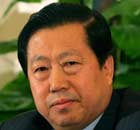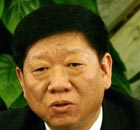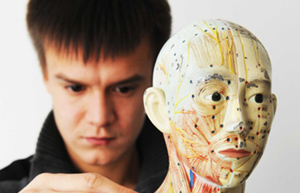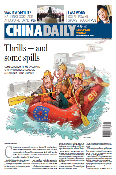'Soft landing' for Chinese economy? Tightening moves matter
Updated: 2010-11-29 10:31
(Xinhua)
BEIJING - Two years of monetary easing policies helped China's economy emerge from the global financial crisis. Now, facing a runaway inflow of hot money, fast loan growth, and escalating inflation, China could become serious about tightening regulations to achieve a "soft landing".
Analysts recently said China could see more interest rate hikes in the final month of 2010 in a bid to soak up excessive liquidity and prevent a potential overheating of the economy.
Further, the People's Bank of China (PBOC) Deputy Governor Hu Xiaolian said on Oct 24 that using multiple monetary policy tools to improve liquidity management and guide the money and credit growth back to normal would be the main task for the central bank in the remainder of this year.
According to data released by the central bank Friday, in October those funds outstanding for foreign exchange (FOFE) hit 525.1 billion yuan ($78.37 billion), the second highest monthly record in history.
That is to say, PBOC issued 519 billion yuan of renminbi in October to purchase the same amount of fresh inflow of foreign exchanges, which usually enter the nation in the form of trade surplus, foreign direct investment and short-term international speculative funds.
"The huge inflow of hot money is an important reason behind the sharp rise in FOFE," said Zhang Ming, a researcher with the China Academy of Social Sciences (CASS).
He noted, as the European debt crisis ceased, that speculative funds have returned to the emerging markets, notably after the US Federal Reserve announced the second round of its quantitative easing policy.
"As the massive inflow of foreign exchange increases the domestic monetary base, it has become a major impetus of a broad money supply, which could exacerbate inflation," said Liu Yuhui, also a researcher with CASS.
Hefty foreign exchange inflow usually goes together with soaring inflation. China's FOFE hit a record 525.1 billion yuan in April 2008. In the same month, China's Consumer Price Index (CPI), a main gauge of inflation, was up by 8.5 percent, which was unprecedented.
Also, this October, the CPI rose by 4.4 percent, the highest amount in 25 months.
Boosted by a massive trade surplus, the domestic monetary situation began easing in late 2008, as China's broad money supply exceeded 70 trillion yuan, surpassing the United States to become the world's largest.
Li Daokui, a member of the monetary policy committee with the PBOC, said hefty money supplies posed huge risks to the nation' s banking system and, more imminently, would exacerbate the current inflation.
"The interest rate increase last month sent a signal that more such increases will come in the future," he said.
Further, the PBOC raised the benchmark lending and deposit rates by 25 basis points from Oct 20. It also hiked the reserve requirement ratio (RRR) five times this year, which have forced the nation's top four banks to set aside 18.5 percent of their deposits.
"The bank reserve ratio increase could not sort out the current negative interest rates. So one more interest rate rise is very likely in December," said Liu Ligang, head of the research sector of the Australia & New Zealand Banking Group.
"Hikes of interest rates and in the reserve ratio could come more frequently," the Shanghai-based Guotai & Junan Securities said in a note to clients.
On Oct 24, PBOC Deputy Governor Hu Xiaolian said that "multiple monetary policy tools", including "quantitative and price tools", would be put into place.
Analyst said Hu's mention of "price tools" is the first such recent reference. That increases the possibility of a second interest rate hike for this year.
Also, a popular expectation of more interest rate hikes could be reflected by the unchecked new yuan loans in October.
In October, new loans unexpectedly hit 587.7 billion yuan. It added the total new loans in the first ten months to 6.9 trillion yuan, slightly less than the full-year target of 7.5 trillion yuan.
Many financial institutions have estimated that November's new loans are very likely to exceed 500 billion yuan.
Lu Zhenwei, senior economist of the Industrial Bank Co Ltd, said the lending spree at the year-end revealed popular expectations that lending will be more difficult and expensive in the future.
"Under such circumstances, enterprises want to lend as much as possible, regardless whether they need it or not. Banks are also pleased to lend before the central bank announced more stringent credit quotas for next year," he said.
In October, loans for residents reached 212.3 billion yuan, seen an evidence of a stable turnover in the housing and auto markets, according to Guotai & Junan Securities's report.
Lu Zhengwei said Hu Xiaolian's remarks showed the central bank's resolution to cap credit. "Even if the target was overshot, the margin will be small," he said.
Also, Yang Sen, analyst with the Xiangcai Securities, said loan targets for 2011 would be between 6.5 trillion yuan and 7 trillion yuan. Although it is much less than 2009's 9.6 trillion yuan and the level in 2010, it will be enough to support continuing economic growth.
Li Daokui said that as China's economic growth has stabilized, it is the appropriate time to shift the relatively easy monetary policy to a more prudent one.
The State Information Center, a government think tank, estimated China's economic growth would slow to 8.7 percent in the fourth quarter, mainly as a result of the economic restructuring.
Paper's Digest

China bags Asiad team tennis title after 24 yrs
Wimbledon semifinalist Li Na led host China to capture the team tennis title on Tuesday at the Asian Games, accomplishing her Asiad tour with three consecutive victories.
China rate rises no panacea to curb inflation: PBOC adviser
Specials

Safeguarding environment a priority
China continues to face mounting pressure to curb environmental degradation, despite progress in reducing pollution over the last five years, the environmental protection minister warned.

Employment to remain a continuing challenge
China's top labor official said the country will face a tough employment situation in the next five years.

Russian possessed with TCM
Born into a family of doctors, Maxime became interested in Traditional Chinese Medicine (TCM) at the age of 12, after hearing about TCM theories such as health preservation and recuperation.





